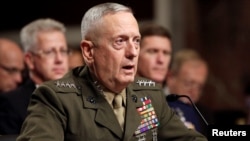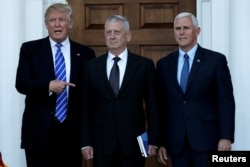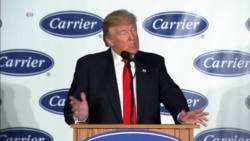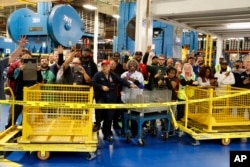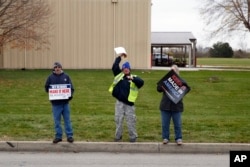President-elect Donald Trump has picked retired Marine General James Mattis as his defense secretary, but Mattis will need a change in a federal law to be able to take the job.
Trump, appearing at a postelection victory rally in Cincinnati, Ohio, Thursday night, made his choice official after a day of unconfirmed media reports.
Mattis, who earned the nickname "Mad Dog" because of his comments that he likes to fight, was a commander in the wars in Afghanistan and Iraq. A former top Pentagon official told The Washington Post that Mattis was highly respected.
"He's a warrior, scholar and straight shooter ... he speaks truth to everyone and would certainly speak truth to this new commander in chief," the official said.
But for Mattis to be approved by the U.S. Senate, Congress will have to waive a law requiring defense secretaries to be retired from active service for at least seven years. Mattis retired in 2013.
Indiana visit
Trump headed to the U.S. heartland Thursday, celebrating with some of the voters who are sending him to the White House, while touting his success at keeping nearly 1,000 manufacturing jobs from leaving the country for Mexico. *
He visited a Carrier Corporation plant in Indiana after he and Vice President-elect Mike Pence, who is in his last weeks as Indiana's governor, wooed the manufacturer's executives with $7 million in tax incentives to keep the jobs in the state, even as the company sends others to Mexico.
Trump vowed to keep other companies from leaving the country and promised if they did, their products would "be taxed very heavily at the border" if they tried to then sell the goods in the United States.
WATCH: Trump Talks About Jobs, Taxes, Regulations
"Companies are not going to leave the United States anymore without consequences," said Trump, the billionaire real estate mogul who won the hearts and votes of blue-collar workers by promising to boost the U.S. labor market. "Leaving the country is going to be very, very difficult."
Carrier, a heating and air-conditioning company, is owned by the industrial conglomerate United Technologies. It said earlier this year it was relocating its Indiana furnace plant to Mexico to cut costs.
Carrier said factors in its decision to stay included financial incentives from Indiana and a promise from the incoming Trump administration to "create an improved, more competitive U.S. business climate."
The company said it would invest $16 million in the Indiana operations in the coming years, pledging to continue making gas furnaces in Indianapolis and to base engineers and other corporate staff there as well.
Later Thursday, Trump held his campaign-style rally in Cincinnati. The Ohio visit was to be his first stop on what he is calling a "thank-you tour" to greet some of the enthusiastic supporters who turned out for him on Election Day. Trump has not detailed where else his tour will go, but several other stops are expected in the coming weeks, in states that carried Trump to victory.
The U.S. industrial region was key to Trump's stunning upset win, as he captured four states that the country's Democratic president, Barack Obama, had twice won in his successful White House campaigns.
The U.S. has lost 5 million manufacturing jobs since 2000, some to automation and some to overseas locations where company owners are paying workers less.
Trump may have had some leverage over United Technologies, which also owns a company that supplies fighter jet engines and relies in part on U.S. military contracts.
Local union leaders expressed gratitude for Trump highlighting their cause.
"We really appreciate him doing that. It's really getting the message out," Chuck Jones, president of United Steelworkers Local 1999 in Indianapolis, the union representing Carrier workers, told VOA in April.
VOA's Carla Babb contributed to this report.
* Editor’s note: President-elect Donald Trump and the Carrier Manufacturing Corporation claim that more than 1,000 jobs will remain in Indiana thanks to a deal struck between the incoming administration and Carrier.But several news organizations, as well as the head of the union representing many Carrier workers, say the actual number of jobs saved is around 800.VOA attempted to verify how many jobs were preserved, however the public relations department at United Technologies Corp., Carrier’s parent company, is not accepting questions from the media.




